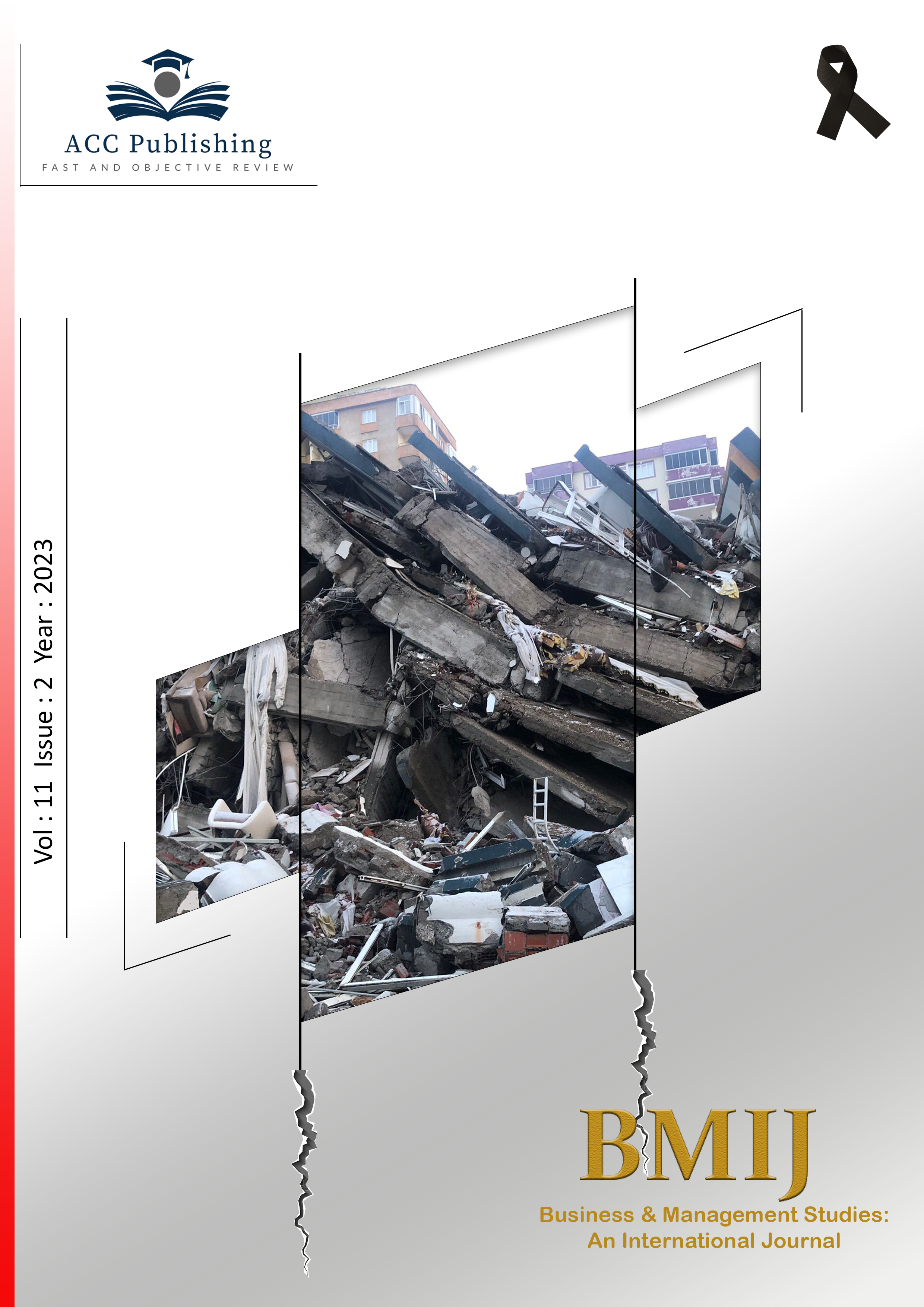Muhasebe alanında işyerinde eğitim yapan öğrencilerin uygulamaya ilişkin değerlendirmeleri: Akdeniz Üniversitesi örneği

Yayınlanmış 26.06.2023
Anahtar Kelimeler
- İşyerinde Eğitim, 7 1 Eğitim Modeli, Muhasebe Eğitimi
- Workplace Training, 7 1 Training Model, Accounting Education
Nasıl Atıf Yapılır
Telif Hakkı (c) 2023 Ahmet Kaya

Bu çalışma Creative Commons Attribution-NonCommercial-NoDerivatives 4.0 International License ile lisanslanmıştır.
Nasıl Atıf Yapılır
Öz
İşyerinde eğitim, öğrencilerin hayata hazırlanması ve iş dünyasının ihtiyaç duyduğu nitelikli insan gücünün yetiştirilmesinde önemli bir uygulamadır. İşyerinde eğitimin amacı, işyeri eğitim modeli aracılığıyla nitelikli bir işgücü yetiştirmek ve üniversite-sanayi iş birliği yoluyla üniversitenin ve endüstrinin kaynaklarını paylaşarak bir sinerji oluşturmaktır. Bu çalışma Finans ve Bankacılık Bölümü son sınıf öğrencilerinden muhasebe alanında işyerinde eğitim yapan öğrencilerin işyerinde eğitim (7+1 eğitim modeli) öncesindeki ve sonrasındaki algılarının, tutumlarının, beklentilerinin, karşılaştıkları zorlukların ve kariyer planlarının değişip değişmediğini belirlemeyi amaçlamaktadır. Toplam 15 öğrenci ile işyerinde eğitim başlamadan önce ve bittikten sonra yüz yüze yarı yapılandırılmış mülakatlar gerçekleştirilmiştir. Öğrencilere algı, tutum, beklenti, kariyer hedefleri ve olası güçlükler başlıklarında toplam 11 soru yöneltilmiştir. Sonuçlar, özellikle tutum ve kariyer hedefleri boyutları bakımından öğrencilerin eğitim öncesi ve sonrası dönemdeki görüşlerinin farklılaştığını göstermektedir. Bulgular, öğrencilerin hem muhasebe derslerine hem de muhasebecilik mesleğine ilişkin ön yargılarının değiştiğini işyerinde eğitim sayesinde mesleğe ve derslere yönelik ilgilerinin arttığını ortaya koymaktadır. Ayrıca, öğrencilerin eğitim sonrasında kariyer hedeflerinin mesleğe yönelik olumlu bir şekilde değiştiği ve birçok öğrencinin işyerinde eğitim firmasından teklif aldığı belirlenmiştir.
Referanslar
- Ajzen, I., & Fishbein, M. (1980). Understanding attitudes and predicting social behaviour. Englewood Cliffs, NJ: Prentice Hall.
- Arpat, B., Kalfa, V. R., Akşit, A., & Çamurdan, B. (2017). Meslek Yüksekokullarında Nitelikli Ara Eleman İhtiyacını Karşılamada Yeni Arayışlar: 3+1 İşbaşı Eğitim Modeli Honaz Meslek Yüksekokulu Örneği. Çalışma İlişkileri Dergisi, 8(2), 76–94.
- Arpat, Bülent. (2018). Meslek Yüksekokullarında Uygulanan İşbaşı Eğitimlerinde Boylamsal Bir Değerlendirme: Honaz Meslek Yüksekokulu Örneği. MANAS Journal of Social Studies, 7(3), 345–359.
- Atalı, G., Özkan, S. S., Sarıbıyık, M., & Karayel, D. (2016). Türkiye’de Yükseköğretim Kurumlarında Uygulanan Uygulamalı Eğitim Modellerinin İncelenmesi. In 5th International Vocational Schools Symposium (pp. 276–281). Prizren.
- Ceylan, R., & Hacıhasanoğlu, T. (2022). A Qualitative Study on the Problems of Accounting Professionals in Covid-19 Period in Yozgat Province. Cumhuriyet Üniversitesi İktisadi ve İdari Bilimler Dergisi, 23(3), 774–789.
- Çolaksel, M. (2019). 3+1 Eğitim Modelinin Turizm Öğrencilerinin Mesleki Gelişimlerine Etkisi (Sakarya Uygulamalı Bilimler Üniversitesi Örneği). Sakarya Uygulamalı Bilimler Üniversitesi.
- Dündar, A. O., Telli Üçler, Y., & Başaran Alagöz, S. (2019). Lojistik Öğrencilerinin İş Başı Eğitiminden Tatmin Düzeylerinin Belirlenmesi Üzerine Bir Araştırma: Necmettin Erbakan Üniversitesi Örneği. Selçuk Üniversitesi Sosyal Bilimler Meslek Yüksekokulu Dergisi, 22(2), 675–686.
- Eryılmaz Ballı, F., & Herdem, F. (2022). Meslek Yüksekokulu Öğrencilerinin Covid-19 Pandemisi Sürecinde Eğitim – Öğretim Yaşantıları: ISUBU Örneği. Journal of Higher Education and Science, 12(2), 294–304. https://doi.org/10.5961/higheredusci.1037988
- Gbogbor, Y. J. (2022). Developing Hands-On-Training Approach for Skill Acquisition in Business Education Programmes in Ignatius Ajuru University of Education, Rivers State. International Journal of Modern Innovations & Knowledge (IJMIK), 3(1), 114–126.
- Gül, H., & Yürekli, E. (2020). MYO’lardaki 3+1 İşbaşı Eğitimlerinin Girişimcilik Eğilimine Etkisi: PAÜ Örneği. MANAS Sosyal Araştırmalar Dergisi, 9(4), 2407–2417.
- Gümüş, İ., & Örgev, C. (2018). Beşeri Sermayenin Etkinliği Açısından Turizm Ön Lisans Eğitiminde Uygulamalı Mesleki Eğitimin Önemi. Uluslararası Türk Dünyası Turizm Araştırmaları Dergisi, 3(2), 202–214.
- Güngör Karyağdı, N. (2022a). Denetimde Teknolojik Gelişmelerin Denetim Sürecine Olan Etkilerinin Akademisyen Görüşleriyle İncelenmesi. Denetişim, (26), 13-31.
- Güngör Karyağdı, N. (2022b). Uzaktan Denetimin Denetim Sürecine ve Verimliliğine Katkısının İncelenmesi: Denetçi Görüşlerinin Değerlendirilmesi. Dicle Üniversitesi Sosyal Bilimler Enstitüsü Dergisi, (31), 14-36.
- Haven, L. T., & Van Grootel, D. L. (2019). Preregistering qualitative research. Accountability in Research, 26(3), 229–244.
- Jayapriya, J., Muruganandam, D., Abdul Wahid, A., & Suburaj, M. (2020). Discrepancy integrating institutions with industries an opportunity for hands on training. Procedia Computer Science, 172(2019), 669–672. https://doi.org/10.1016/j.procs.2020.05.087
- Özkan, T., & Alan, B. (2022). Workplace Application and Student Skill Acquisition as Part of the 3+1 Education Model in Vocational Schools. Yükseköğretim Dergisi, 12(1), 153–167. https://doi.org/10.2399/yod.21.633795
- Pekşen, D. Y. (2017). Denizcilik Eğitimi Veren Önlisans Programlarına 3+1 Eğitim Modelinin Uygulanması. Ulusal Eğitim Akademisi Dergisi, 1(1), 8–18.
- Şahin Ören, T., & Ören, V. E. (2018). Meslek Yüksekokulu Öğrencilerinin 3+1 Eğitim Modelinden Tatmin Derecelerinin Belirlenmesi: Banaz Meslek Yüksekokulu Örneği. Yükseköğretim ve Bilim Dergisi, 8(3), 451–456. https://doi.org/10.5961/jhes.2018.286
- Sarıbıyık, M. (2013). Meslek Yüksekokullarında Nitelikli İşgücü Yetiştirmek İçin 3+1 Eğitim Modeli. Academic Platform Journal of Engineering and Science, 1(1), 39–41. https://doi.org/10.5505/apjes.2013.32042
- Seidman, I. (2006). Interviewing as qualitative research: A guide for researchers in education and the social sciences. New York: Teachers college press.
- Tekbalkan, M., & Karataş, F. (2021). Turizm İşletme Yöneticilerinin Meslek Yüksekokullarında Uygulanan 3 + 1 Eğitim Modelinden Beklentilerini Belirlemeye Yönelik Bir Araştırma, Turizm Çalışmaları Dergisi, 4(1), 31–40.
- Türk, K., Bakkal, S., & Türk, D. (2017). 3+1 Mesleki Uygulama Sonrası Sosyal Programlar İle Teknik Programlarda Okuyan Öğrencilerin Uygulama Sonrası Beklentilerinin Karşılaştırılması. Mehmet Akif Ersoy Üniversitesi Sosyal Bilimler Enstitüsü Dergisi, 137–147. https://doi.org/10.20875/makusobed.314216
- Yang, B., Wang, Y., & Drewry, A. W. (2009). Does it matter where to conduct training? Accounting for cultural factors. Human Resource Management Review, 19(4), 324–333. https://doi.org/10.1016/j.hrmr.2009.03.002
- Yıldırgan, R., Taşçıoğlu Baysal, H., & Zengin, B. (2016a). Turizm İşletmeleri Yöneticilerinin 3+1 Eğitim Modeli Kapsamındaki Uygulama Öğrencilerine Yönelik Düşüncelerinin Değerlendirilmesi: Sakarya Üniversitesi Örneği, Nişantaşı Üniversitesi Sosyal Bilimler Dergisi 4(1), 19–29.
- Yıldırgan, R., Taşçıoğlu Baysal, H., & Zengin, B. (2016b). 3+1 Eğitim Modeli Kapsamında İşletmelerde İstihdam Edilen Turizm Önlisans Öğrencilerinin Mesleğe İlişkin Tutumları: Sakarya Üniversitesi Örneği, Nişantaşı Üniversitesi Sosyal Bilimler Dergisi, 4(1), 101–116.
- Yürekli, E., Arpat, B., & Çamurdan, B. (2018). Muhasebe Meslek Mensuplarının 3+1 İşbaşı Eğitimi Modeline Yaklaşımları Denizli İlinde Bir Alan Araştırması. İktisadi İdari ve Siyasal Araştırmalar Dergisi, 3(6), 102–110. https://doi.org/10.25204/iktisad.353499



